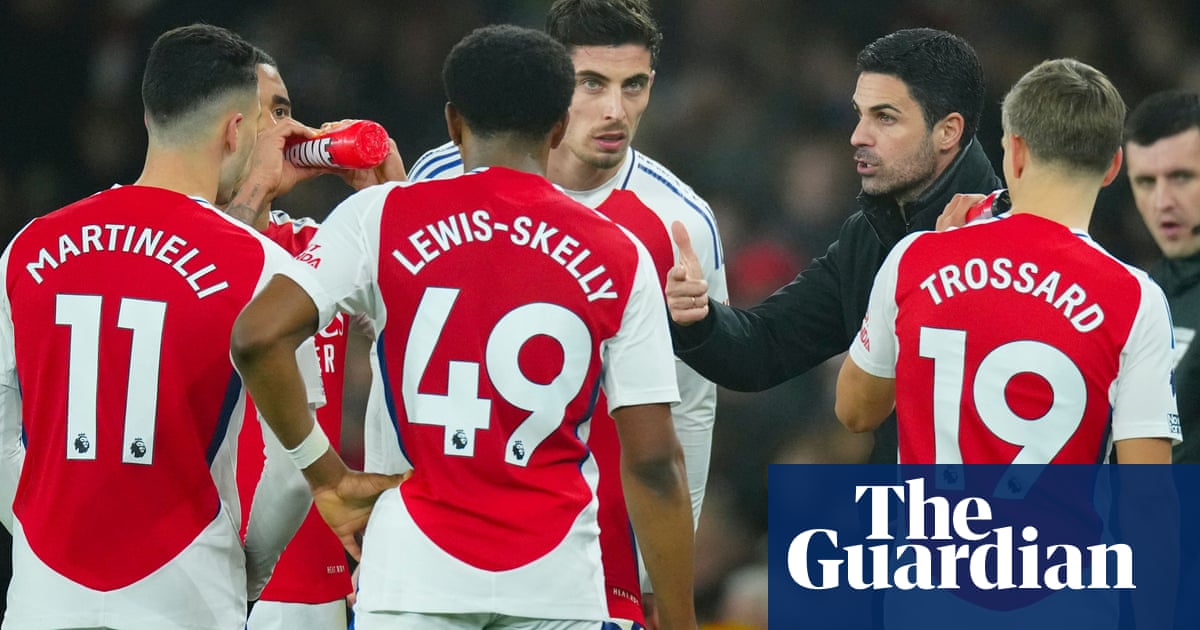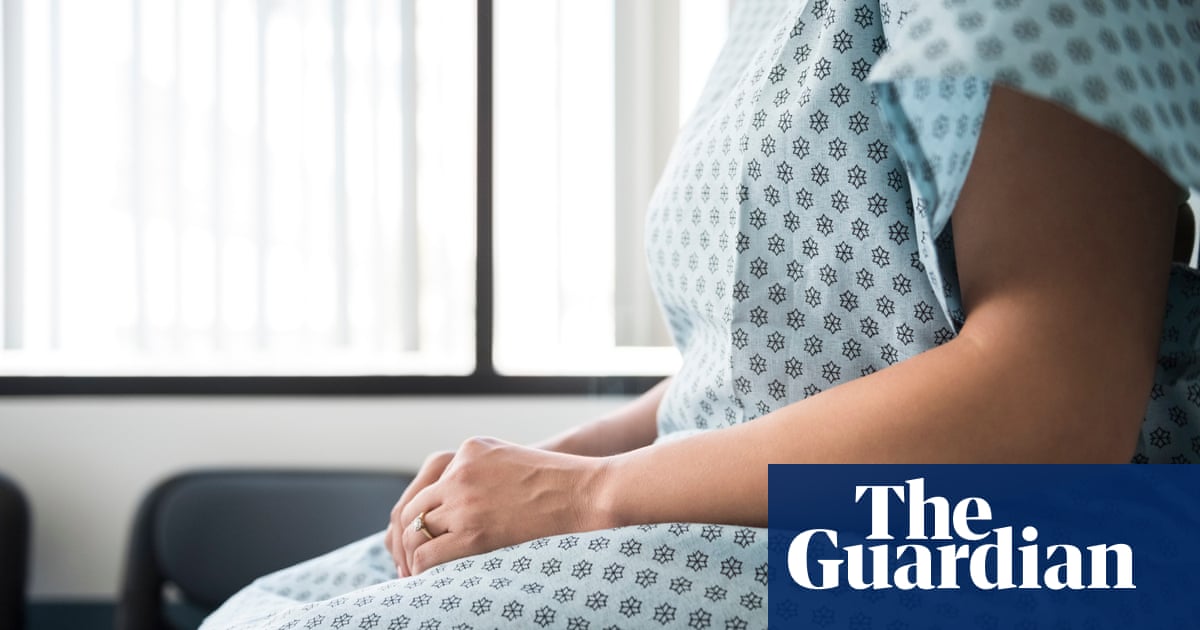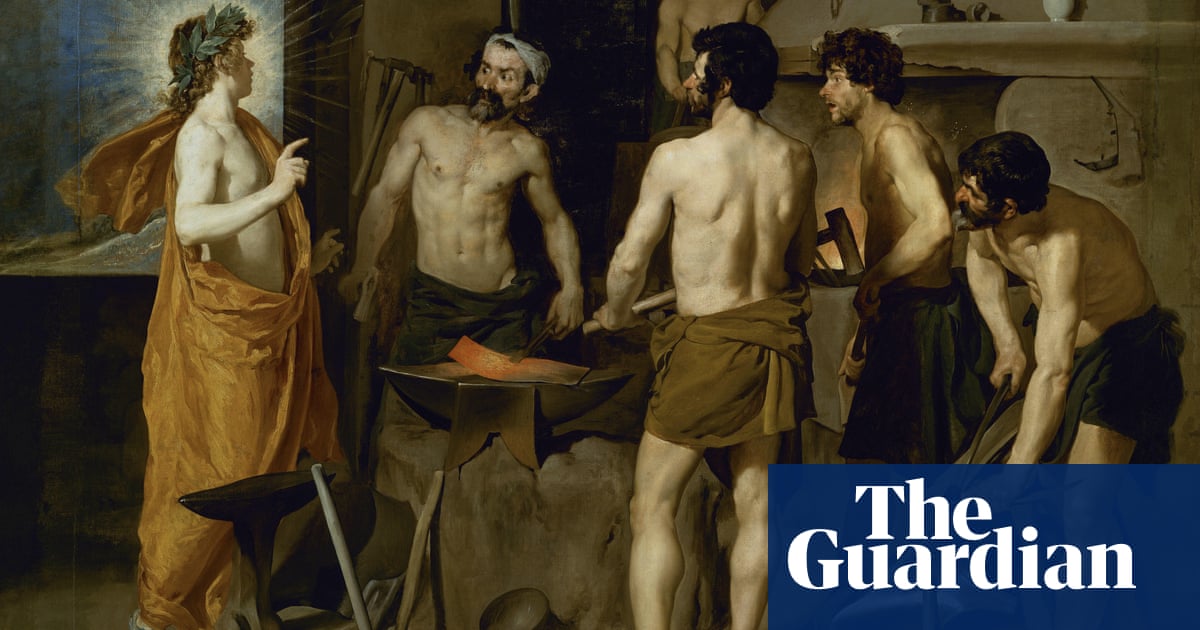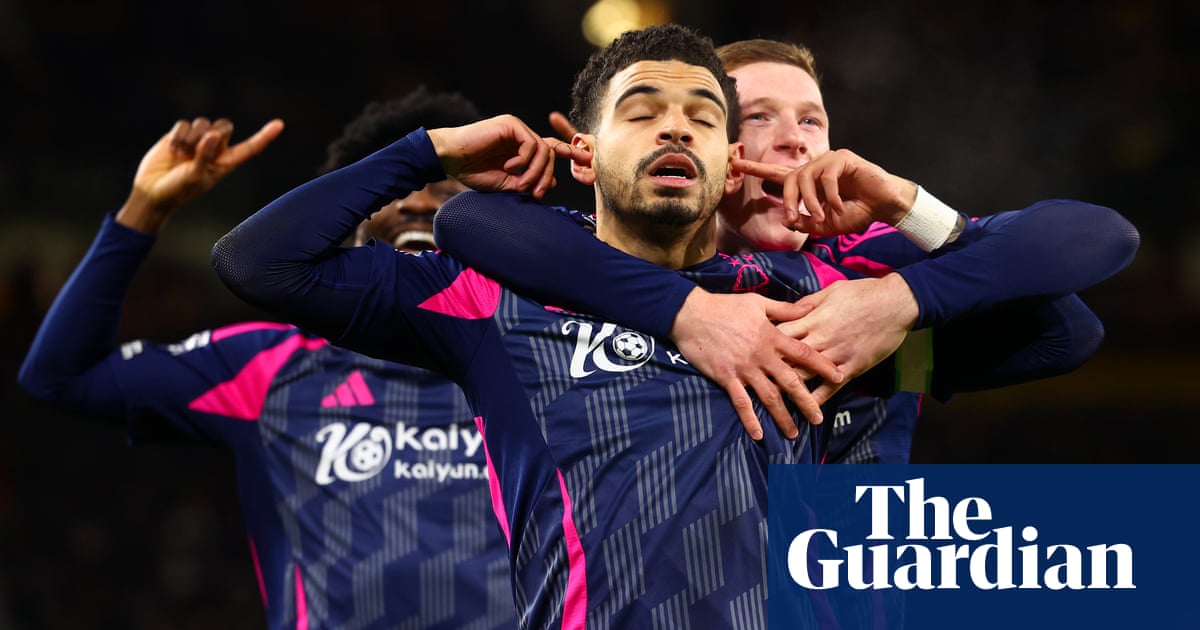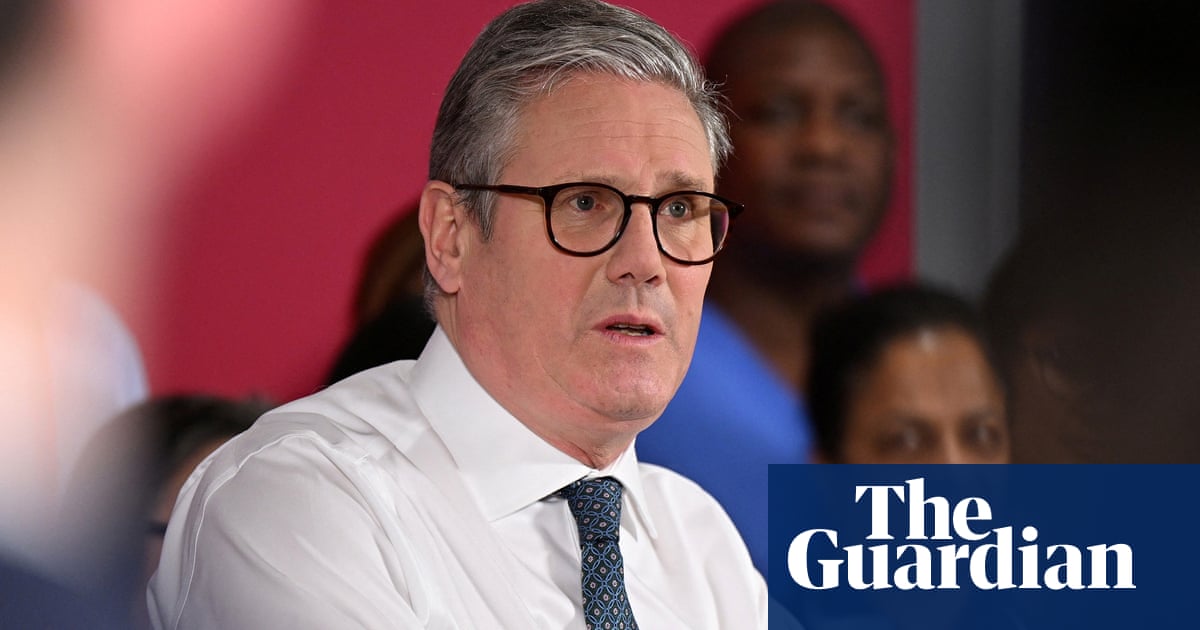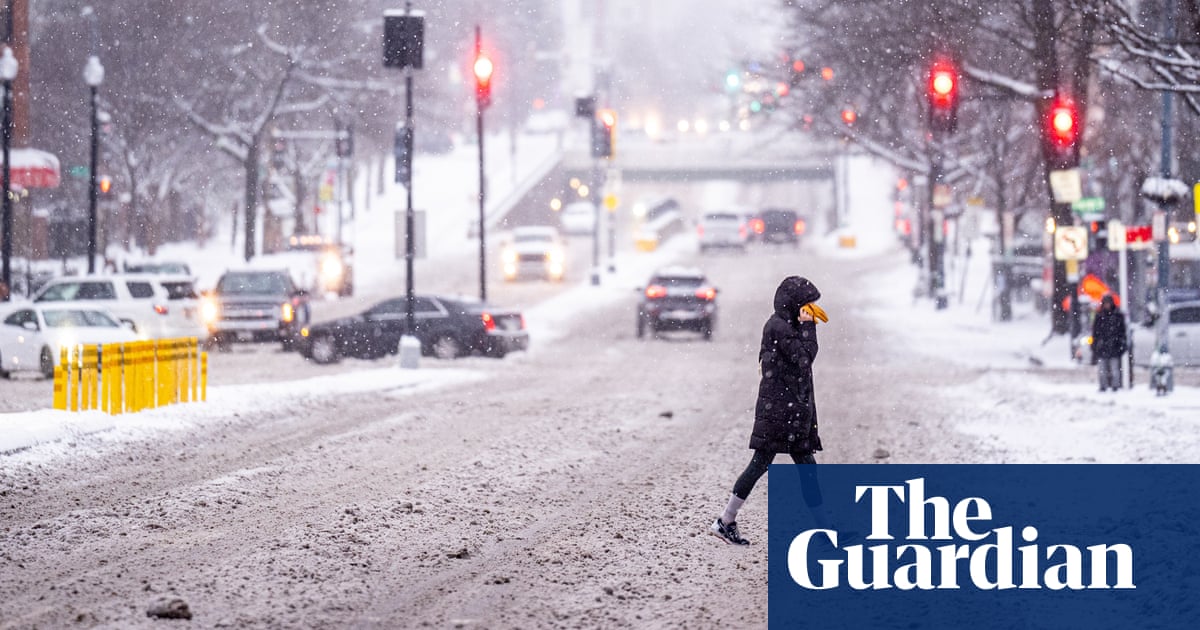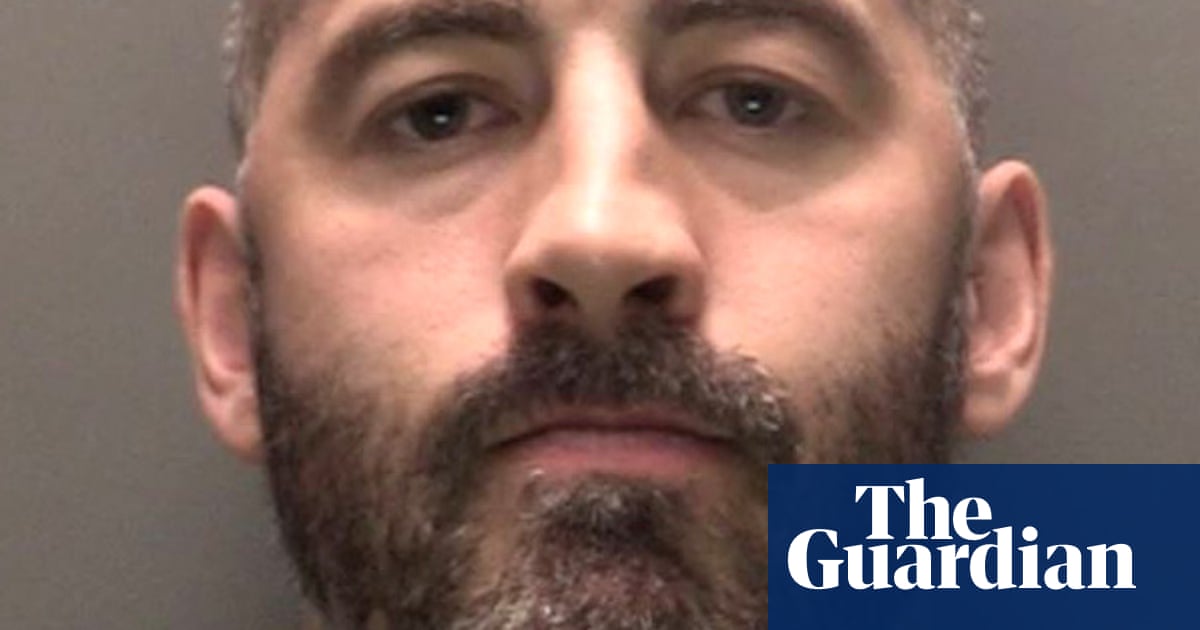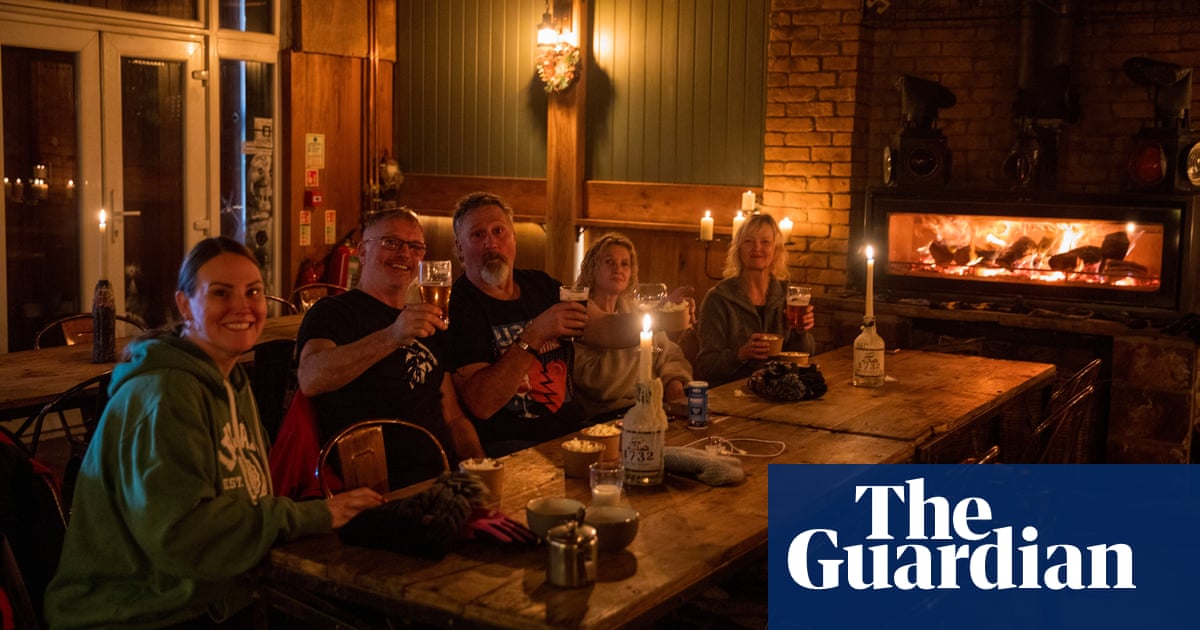Wael al-Dahdouh was live on air when he realised something was wrong. It was 25 October 2023, about 5pm, and Al Jazeera’s bureau chief in Gaza was standing on the roof of the channel’s office building, speaking about the day’s airstrikes. “It’s going to be a bloody night,” said Dahdouh, his voice playing over live images of the skyline, as explosions flared on the horizon.
Out of the corner of his eye, Dahdouh noticed his nephew Hamdan, a producer with Al Jazeera, looking agitated. Then Dahdouh’s mobile phone, slotted in his flak jacket, began to ring. Hamdan reached over, pulled the phone out and answered it. It was an odd thing to do while they were on air, Dahdouh thought. Alarmed, he addressed Hamdan. “Who is it?” Dahdouh asked, still audible to viewers. After a few seconds on the phone, Hamdan angrily kicked a wall. “What’s going on?” Dahdouh asked. Hamdan replied: “Your daughter. The girl is in the hospital. They have struck the place where your wife and family are.” Dahdouh took the phone. As viewers continued to see live scenes from Gaza, they could hear Dahdouh’s rising alarm and Hamdan’s flustered interjections in the background. Then the transmission cut to the studio in Doha.
On the phone was Dahdouh’s 21-year-old daughter, Khulood, who was bewildered and unable to give him a clear idea of what was happening. He hung up and rushed to Nuseirat camp seven miles away, where his wife and seven of his eight children had been sheltering in an Israeli-designated safe zone. When he arrived about 40 minutes later, Dahdouh found a chaotic scene. People were digging in the rubble with their hands, using their mobile phone torches to see. Some were in tears, others wailing the names of the dead. In the debris, Dahdouh found his 18-month-old grandson, Adam, covered in dust, unconscious. Cradling the boy in his arms, Dahdouh raced to al-Aqsa martyrs hospital 15 minutes away.
In the melee outside the hospital, Dahdouh found Khulood. When she saw Adam’s body in her father’s arms, she began screaming and stroking her nephew’s face. Then she collapsed, taking Dahdouh down with her, still clutching the toddler. Dahdouh staggered to his feet. Inside the building, he handed Adam to a doctor and began to search for the rest of his family, lurching through the throngs also looking for their loved ones, through corridors full of the wounded. Dahdouh’s reporting had made him famous in Gaza, and as he continued his search, asking if anyone had seen his wife and children, he started to realise that people were avoiding him, as if they knew something he didn’t. Then an ambulance brought in his youngest son, 12-year-old Yahya. His skull was exposed and his head drenched in blood, but he was conscious. Dahdouh rushed him to a doctor who began to sew up his wounds on the spot. There was no anaesthetic. Yahya screamed in pain, until a dose of anaesthetic was finally found and administered.
As he waited by Yahya’s side, another of Dahdouh’s daughters, as well as his mother-in-law and several cousins, were all brought in to the hospital. He learned from them that Adam’s mother and three of his other daughters had survived the strike. His eldest son, 27-year-old Hamza, was in the south of Gaza, safe. Six of his eight children were now accounted for – either safe or, like Yahya, injured but alive. But Dahdouh’s wife and two more of his children were still missing. The mortuary was the only place he had not looked.
As Dahdouh walked into the makeshift morgue in the grounds of the hospital, known as the “martyr’s tent”, the press and members of the public filmed every moment. Gaza is a small place, at its narrowest point less than four miles wide, and Dahdouh had been reporting there for almost three decades. He was a figure that many Palestinians in Gaza had either met or felt that they knew. Dahdouh could barely walk through the crowds that gathered around him. Some just stared, others shouted words of support or reached out to comfort him.
In the morgue, Dahdouh found the bodies of his 15-year-old son, Mahmoud, his seven-year-old daughter, Sham, and his wife, Amina. Dahdouh picked up Sham and, his face twisted in grief, spoke to her. He fell to his knees next to his wife’s body and held her hand. As he moved from corpse to corpse, the arms of strangers, some of them children, reached out to steady him. It was as he knelt down by Mahmoud’s bloodied body that he let out his first cry, then uttered a phrase that would reverberate around the Arab world: “They took revenge on us through our children.”
In the hours that followed, videos, pictures and accounts of Dahdouh’s tragedy spread quickly across social media. On the day his family members were killed, Dahdouh became a symbol of the devastating losses faced by Palestinians in Gaza and the particular plight of Palestinian journalists.
It was less than three weeks since the start of the war, but the estimated casualties already included thousands of children, and Dahdouh’s own children became totemic of all the others that were being pulled out of the rubble. The dangers facing reporters in Gaza were also becoming apparent. About 20 had been killed, a figure that a senior figure at the Committee to Protect Journalists called “unprecedented”. In all the images of Dahdouh at the morgue, he is still in his flak jacket, the word “Press” emblazoned on it. Here was not only the most senior Palestinian journalist in Gaza, but – as Israel has blocked international press from entering – the most high-profile reporter in Gaza full stop, covering a war that the whole world was watching. His job and stature had offered no protection from the assault.
Dahdouh had barely stepped out of the hospital before he was being interviewed. For weeks he had reported the deaths of others, and now he was the story. In the air raid that claimed his wife and two of his children, Dahdouh’s brother’s five grandchildren – all under 10 – were also killed. His grandson Adam, the 18-month-old he had found in the rubble, was declared dead in hospital. “We suspected that the Israeli occupation would punish Palestinians in Gaza collectively for October 7th,” Dahdouh told his Al Jazeera colleagues in his first interview, minutes after discovering his family’s bodies. “And sadly, this is what happened.”
What he did next made him into the emblem not just of the war’s toll, but of tenacity in the face of unfathomable loss. On the afternoon of 26 October, the cameras followed him as he led the funeral prayer for his family. Dahdouh’s son Yahya stood next to him, head bowed and bandaged, his hands clasped on his chest, his mother’s body wrapped in a blanket on the ground before him. Dahdouh’s voice rang out in prayer, followed by a chorus from the men lined up behind him. After the prayer, Dahdouh stroked the head of baby Adam, wrapped in a small white shroud, one last time before he was buried.
A few hours later, after several attempts by his editors to dissuade him, Dahdouh was back on the air. On screen, he received condolences from the anchor in the Doha studios and then he began to speak, clearly and calmly, about his role as a journalist. It was a ‘‘duty”, he said, “in such historic and exceptional circumstances to continue our coverage with professionalism and transparency, despite everything”. Then he launched into a report on the latest developments in Gaza.
Dahdouh didn’t realise the impact would be so huge. The journalist so committed to his mission that he had returned to work hours after burying his family became a global story. Murals of Dahdouh in his helmet and flak jacket began to appear not only in Idlib in Northern Syria, but in London, and in Dublin. Only after such tributes began to appear, and pro-Palestine protests gathered momentum in the streets of western cities in November, did he understand how many were watching. Dahdouh had covered four wars in Gaza over the previous two decades, but they had not attracted anywhere near the same levels of public attention, sympathy, mobilisation. This war was different.

It was different for Dahdouh, too. The moment he was back on screen, he saw the public’s pride in him. For days, he could barely walk in the street without being offered not only condolences but encouragement. He started receiving calls from strangers. “You do not know me,” one said. “I have lost all my children and my entire family, but in your honour, and in solidarity with you, I will stand firm.”
He was no longer seen as just a high-profile reporter, but a bearer of Gaza’s grief and a symbol of its people’s character. And in a war where so many journalists had already been killed, Dahdouh’s new, magnified role potentially placed him in the crosshairs. He was an experienced war reporter, but this was the first time he felt he might be personally targeted for doing his job.
Over the weeks and months that followed, he became increasingly conscious that he would have to decide between two responsibilities – one towards his work, now more important than ever, and another towards his family. For almost three months Dahdouh juggled both, until it was no longer possible to avoid choosing between them.
‘I couldn’t cry over my children like everyone else,” Dahdouh told me this summer as we sat in his living room in Doha, where he now lives. In Gaza, he felt he had to be the pillar of strength that others needed. His old life was gone, and he could not pause for a moment to take stock or process what was happening. He spoke of this period with a touch of the mystical, with wonder at his own response to his calamity, and the response it drew from others.
In person, Dahdouh was much like his familiar screen persona: composed, easy in his skin, accustomed to holding court. He exuded a cool authority, eschewing vernacular in favour of formal journalistic classical Arabic. But every once in a while another side of him emerged, mischievous and self-deprecating, like a father who commands fearful respect but leavens it with moments of warmth.
Dahdouh was born to a large family – he is one of eight brothers and eight sisters – in northern Gaza in 1970. The Dahdouhs had been there, farming the land, for generations. It was a harsh life, which depended on physically exhausting work, but for most of Dahdouh’s childhood, it was a normal life, too. There was always enough to eat and a roof over everyone’s head. His youth was a “rich period”, Dahdouh told me, full of activities and friends. Swimming was his “first love”, he said. The beach was close to the farm and during school holidays he “lived in the sea”. Adel Zaanoun, now a journalist for Agence France-Presse, grew up with Dahdouh in the neighbourhood of Zeitoun. He described a younger Dahdouh with admiration, pride and affectionate mockery. “You wouldn’t believe it now, seeing how bald he is,” Zaanoun told me, “but then he had a big beautiful head of hair, and every time he won a match or scored a goal he would shake his head vigorously to taunt the losers, his mane swaying like a lion’s.” Dahdouh “was always restless, always loved being the centre of attention”, recalled Zaanoun.
As Dahdouh and his brothers grew older – some dropping out of school early to join the farm, others taking on casual work – their father became passionate about the importance of studying and pursuing a different kind of life. But Israeli military occupation, which began in 1967, confounded those who heeded such advice. Education could seem like a remote and indulgent pursuit when the future was so uncertain.
After becoming the first in his family to finish secondary school, in 1988 Dahdouh received a scholarship to study medicine in Iraq. But the first intifada, or uprising, which began in Gaza in December 1987 and spread to the rest of the occupied territories, scuppered his plans. Days before Dahdouh was due to depart to Iraq to start his medical degree, the Israeli army had come to his home in the middle of the night and arrested him. He was 17.
After three months of interrogation and detention, Dahdouh was charged with what he calls “the usual activities of the intifada” – throwing stones, burning car tyres, and confrontations with armed forces. He was sentenced to 15 years in prison. In keeping with a policy practised during the intifada to deter participation in anti-occupation activity, Israeli authorities demolished his family’s home. “House demolitions were regular during this time,” Zaanoun told me. “Sometimes they would half-demolish a house as a warning.” One or two rooms would be left for the residents to shelter in. If the warning wasn’t heeded, forces would return and demolish it all.
Dahdouh served his time in prisons across Gaza. In institutions run by the police, such as Gaza central prison, he found that inmates were able to collectively pressure authorities to secure basic rights. In the military prisons where he spent about half his sentence, life was much worse. The soldiers were inexperienced, he said, preoccupied not with managing prisoners but breaking their morale. Water was rationed and prisoners did not bathe for weeks at a time. The sewers regularly overflowed, and their effluence was left to stagnate. Over the seven years he ended up spending in prison, he said, he was allowed only two visits by his family.
After he was released in 1995 at the age of 24, Dahdouh tried again to pursue his medical degree in Iraq, but Israeli authorities prevented him from leaving. There were no medical schools at the time in Gaza, but the Islamic University of Gaza had recently launched a new degree, journalism and media studies. Dahdouh enrolled. He got married. (“I had lost seven years,” he said, laughing, “so there was no time to waste.”) In 1998, he began reporting for Al Quds, the largest newspaper across the Palestinian territories and two years later, during the second intifada, Dahdouh began picking up some freelance radio and TV work.
Rushdi Abualouf, who would go on to become a longtime BBC correspondent, met Dahdouh as a fellow journalism student in Gaza. He recalls this period as one where he, Dahdouh, Zaanoun and a handful of others were the only professionally trained reporters working in Gaza. Together they formed a pioneering mini-generation. “We covered every political event in Gaza,” Abualouf told me. “Yasser Arafat knew us all by name and would ask after us if we didn’t show up to a press conference.”
This was a time when satellite TV was becoming a sweeping force across the region. Major news channels, including the Saudi-owned Al Arabiya and the Qatar-funded Al Jazeera, had begun broadcasting, and satellite dishes were becoming cheaper, bringing these new free-to-view channels to a far broader audience. On the airwaves, Arabs met one another for the first time. They gasped at the licentiousness of the Lebanese, with their female pop stars in racy music videos. And they were captivated by the political discussion shows, on Al Jazeera in particular. The first time many Arabs saw their own unelected leaders and Israeli officials face questioning was not on their own censored state channels, but on Arab satellite TV. Debate shows, such as Al Jazeera’s The Opposite Direction, featured criticism of hitherto untouchable parties, such as royal families in the Gulf. Guests frequently came to blows, with the host having to physically intervene. (This made for great TV, and clips of certain altercations still circulate online, having become part of popular culture.)
For Dahdouh, this period seemed almost in the realms of fantasy. Just a few years earlier he had been in prison; now, as a budding broadcast journalist, he was part of a media revolution. By 2004, he was working for Al Jazeera. The life that he had planned to start outside Gaza had been cut off before it could begin, but here, at home, he had found something that felt like a calling.
Dahdouh has covered every conflict in Gaza since Israeli authorities withdrew from the strip in 2005. Over the years, war reporting became a sort of cottage industry in Gaza. When work was scarce, locals could freelance as producers, camera operators, drivers and fixers, building a trusted community where juniors learned from senior professionals such as Dahdouh. His nephew and longtime field producer and cameraman, Hamdan, told me that Dahdouh was “a school” for younger journalists. Almost all of his colleagues with whom I spoke referred to Dahdouh only as Abu Hamza, the father of Hamza, his eldest son, which is a common honorific in the Arab world denoting respect and affection.
After the strike that killed his wife and children, Dahdouh remained in Gaza City, while he sent his four daughters and his son Yahya to relative safety in the centre of the Gaza Strip. Working in a team of four – made up of his nephew Hamdan plus a driver and an editor – Dahdouh continued to report from the field. What viewers didn’t see was that, whenever Dahdouh was on air, behind the camera was a large crowd, packed tight, craning to hear what he was saying. “Whenever people would see him, they would run, pushing each other, to come and listen to him, to hear the news and get updates on their areas,” Hamdan said. There was “no internet or electricity, and local radio stations were destroyed early in the war,” and so, alongside his role as an international correspondent, Dahdouh became a roving one-man local news station.
Dahdouh was now living in the Al Jazeera office, and going straight from there to report each day. This was a “very difficult period”, he told me. Airstrikes were escalating, as Israel laid the ground for a siege of Gaza City and an extension of the ground invasion that had begun on 28 October. Hamdan told me that what he and Dahdouh saw, would “make the hair stand on your head. We walked over body parts.” The nights were the hardest. “No electricity, no people, the sound of the explosions would shake the building. No sleep,” said Dahdouh. When Israeli ground forces entered Gaza City on 2 November, Dahdouh could look out of the office window and see the tanks rolling in.
Dahdouh and his team began to receive messages from family and friends pleading with them to leave. Dahdouh wanted to remain, but after a discussion with his team, he came to see that if they stayed, they would almost certainly be killed or detained, and their work would end. So on 10 November, they took off their press jackets and helmets and left the office. Moments after they departed, the tanks arrived at the entrance of the Al Jazeera building.
Leaving northern Gaza, the place where he had grown up and where the fighting was most intense, was a “very, very, very bitter experience” for Dahdouh. “I felt it was a defeat,” he said. He and his team set up a new operation in Khan Younis and began reporting from all over the central Gaza Strip and Rafah in the south. Meanwhile, the number of journalists working in Gaza was shrinking. On 14 December, the UN raised the alarm over the “unprecedented rate of journalists and media workers who have been killed in Gaza”. By then, according to the UN figures, 50 journalists in Gaza had been confirmed killed.
On 15 December, Dahdouh and cameraman Samer Abu Daqqa went to the aftermath of an airstrike on a school building in Khan Younis. They travelled to the site in an ambulance, accompanying three members of the civil defence forces, a government department responsible for emergency services, who had, through the Red Cross, secured permission from the Israeli military to be in the area.
They arrived at noon. With Israeli drones circling above, Dahdouh and Abu Daqqa reported for more than two hours. Then, as they made their way back to their vehicle, a drone struck. It felt like a storm engulfing him, Dahdouh said. In the moments before he passed out, he was convinced that his time had come. Seven weeks after his family members were killed, he would now also die. He imagined himself in a kind of video game. There would be no more moves or levels to unlock. “Game over Abu Hamza,” he said to himself.
But he came to. His hearing was gone and his arm was numb. As he staggered towards shelter, he realised blood was spurting out of his shoulder. Nearby, he found the dead bodies of the three civil defence workers. Then he saw Abu Daqqa some distance away, on the ground but conscious, gesturing with his hand. Bleeding heavily, Dahdouh tried to get help for his colleague and old friend, but when he found ambulance workers nearby, they said they could not reach Abu Daqqa, fearing that they would be struck as well.
Dahdouh was taken to hospital. Footage shows him lying on a bed, medical workers staunching the flow of blood from his arm, as he calls for Abu Daqqa to be saved. “Samer was with me in the place. Samer was screaming,” Dahdouh kept saying, between cries of agony as he was being treated. “Coordinate with the Red Cross,” he said. “Make someone go and get him.”

Al Jazeera’s bureau chief in Ramallah, Walid al-Omari, followed protocol by contacting the International Committee of the Red Cross to request that they seek Israeli permission for an ambulance. Crucial hours passed as the rescue crews waited for IDF approval to access the location safely. Al Jazeera began to broadcast a live counter on its news channel, showing the hours and minutes that were passing without Samer receiving assistance. About five hours after the airstrike, permission and facilitation to access the site was granted. When ambulances reached him half an hour later, they found Abu Daqqa dead. He was the first Al Jazeera journalist to be killed in Gaza since the start of the war.
Dahdouh spent one night in intensive care. The next day he was at his friend’s funeral, stroking his face and sobbing. His eldest son, Hamza, stood behind him and a sea of bodies once again formed around Dahdouh as he buried a loved one. And once again, Dahdouh was back on air hours later, this time with his arm bandaged and cannulas sticking of out of his wrists.
One of Dahdouh’s nicknames is Al Jabal, the mountain. “I am a stubborn man,” Dahdouh said to me, explaining why he chose not to leave after his injury. He had experienced so much loss, seen so much death and come so close to dying himself that he no longer had any fear. “Life and death,” to him, “had become the same.” All that he cared about was that when death came, it would find him “on his feet”. He was certain that as long as he was alive, no matter how badly injured, he would stay in Gaza and keep reporting.
“So many high profile people called him to persuade him,” Zaanoun, his childhood friend, told me. For most Palestinians in Gaza, leaving was impossible, but Dahdouh was in a different position. Al Jazeera had sometimes managed to extract permission from the Israeli authorities for staff members and their families to be evacuated. Zaanoun and others told him his departure would not be seen as a defeat. He had done enough and it was time to take care of his family, and himself. Without urgent medical care, he might lose his arm. Besides, he had become too totemic now. The risk of him being targeted by Israel was higher than ever, they said. What would be his value to anyone if he was killed?
Three days after the airstrike, Dahdouh decided that he would go along with the steps required to leave Gaza – but he harboured a secret plan. If his family was allowed to leave through the Rafah crossing, he would go with them to the border. Once they had crossed, he would then turn back. He would trust Hamza with the responsibility of “leading the Dahdouhs into the future”.
Hamza was not just the eldest son, but Dahdouh’s support and backbone. A journalist who had learned the trade from his father, Hamza had recently joined Al Jazeera himself. Over the years, when Dahdouh was away from home on assignment, it had been Hamza who took his place. Dahdouh spoke of his son with pride: he was kind, generous, ambitious. When he had divulged his plan to Hamza in the final week of December, his son told him he’d had the same idea, except in his version, his father would cross and Hamza would return. Dahdouh overruled him, and they waited for permission to come through.
In late December, the Egyptian Journalists’ Syndicate received approval for Dahdouh and his remaining grandchildren, children and their spouses to leave on 2 January, via the Rafah crossing. They began preparations, but the night before their departure, Dahdouh realised that the list of those approved was missing the names of one daughter and two grandchildren.

Over the next few days, as Dahdouh waited for the correct paperwork to come through, he remained in Khan Younis, continuing his reporting. Hamza did the same, reporting on his beat in Rafah, covering the aftermath of airstrikes in the city, and particularly those near the Kuwaiti hospital where he was based.
Then, on 7 January, as Dahdouh was in the field, he received news that Hamza had been injured. Dahdouh made his way to the site of the attack, took one look at the car his son had been in when it was struck and knew that he was dead. He found him in the morgue of the Kuwaiti hospital. Hamza was in a body bag. Dahdouh pulled him out of it and embraced him. He felt something. He could have sworn Hamza hugged him back.
As he described to me what he saw, Dahdouh paused and, drawing on decades of professional habit, prepared, as he often did, to come up with a concluding thought, some note of fatalism and determination as he closed the scene and handed back to the studio. But nothing came. He drew a deep breath. “It was all out of my hands,” he said.
On the day of Hamza’s funeral, the public swirled around a dazed Dahdouh. Once again, Dahdouh became the conduit for an entire society’s grief. Children clustered around him as he received condolences. An elderly woman placed her hand on Dahdouh’s head and prayed for him. Dahdouh’s tragedy was international news. The US secretary of state, Antony Blinken, who was in Doha at the time, called the killing an “unimaginable loss”. As a parent, he couldn’t “begin to imagine the horror” that Dahdouh had experienced, “not once, but now twice”.
During our conversation in Doha, I offered Dahdouh a break several times and suggested returning at a later date if he preferred. He refused, saying that he needed to get it all out in one go. The one break Dahdouh accepted during our hours of conversation was when we came to the subject of Hamza. To him, Hamza had a special place. As the conversation extended into the evening, a pattern appeared, one of referring to Hamza, then circling away from him into another anecdote or observation. At one point, after he had spoken of finding his son’s body in the morgue, Dahdouh tried to capture Hamza in words. He began to speak about all he was poised to achieve as a journalist. Then Dahdouh paused, reaching again to strike a note of reconciliation with what happened. He shook his head. “That was his story,” was all he could say.
Two days after Hamza’s killing, Dahdouh went with his family to the border, now with a complete list of evacuees. He ensured that they would all be allowed to pass safely, then, as he had always planned to do, he turned back. His place was in Gaza, even if it seemed only a matter of time before he was killed, too.
But a few days after his family crossed, Dahdouh began to yield. Hamza’s death had changed everything. Rushdi Abualouf, who has known Dahdouh for 30 years, described it as the “knockout punch”. Without Hamza, Dahdouh felt less certain of his family’s fate abroad. The logic of departure, which he previously dismissed out of hand, became more persuasive. “In war, it is the women and children,” Dahdouh said, explaining his change of heart, “who break your back.” At Hamza’s funeral, one of Dahdouh’s daughters had kissed her brother’s corpse then wrapped her hands around her father, crying. “Please stay with us,” she pleaded, “we have no one left but you.”

So in the second week of January, he prayed. He resorted to the istikhara, in which the supplicant seeks God’s help in making a choice, places the decision in his hands and asks for yaqeen, a serene state of knowledge and enlightenment. Dahdouh felt that contentment after the prayer in his decision to leave Gaza and join his family.
On 16 January, Dahdouh crossed into Egypt, then departed to Doha. He handed over to a younger journalist, Ismail al-Ghoul, in northern Gaza, the most dangerous part of the strip, and told him that if he also wished to stop working and seek refuge with his family in the south, no one would blame him. Al Ghoul refused. A few months later, he was dead.
Over the past year, longstanding tensions between Israel and Al Jazeera, which is funded by Qatar, have turned into open conflict. In May, the Knesset unanimously voted to ban Al Jazeera in Israel, which it described as a threat to Israeli security and a propaganda tool for Hamas. On the same day, Al Jazeera offices in occupied East Jerusalem were raided by Israeli authorities and equipment confiscated.
In mid-July, at Al Jazeera’s headquarters in Doha, I met with Tamer al-Mishaal, who runs the Gaza reporting team. He spoke of Dahdouh with concern, but without pity or alarm. At least he was now safe. Al Mishaal’s focus was on the remaining correspondents in Gaza, who needed a couple of hours each day just to secure food and clean water. In addition to what he called Dahdouh’s family’s “extermination”, al-Mishaal said that Moamen Al Sharafi, a reporter based in south Gaza, had lost 22 members of his family in a single bombing. Their bodies are still under the rubble. On 31 July, al-Mishaal lost two members of his team: Dahdouh’s replacement, Ismail al-Ghoul, and cameraman Rami al-Refee were killed in an Israeli airstrike. Two hours before the attack they had been broadcasting live from Gaza City.
In September, Israeli soldiers closed down Al Jazeera’s office in the West Bank city of Ramallah, claiming that the channel was “inciting terror” and “supporting terrorist activities”. Then, on 7 October 2024, Al Jazeera cameraman Ali Attar was injured during a strike outside al-Aqsa hospital in central Gaza, where he was sheltering with other civilians. Two days later, a sniper drone opened fire on another Al Jazeera cameraman, Fadi al-Wahidi, and a team of other journalists as they were reporting on the assault on Jabalia refugee camp in the north of Gaza. All were wearing Press flak jackets. Al Wahidi was shot in the neck. Attar and al-Wahidi remain in critical condition, the latter in a coma.
When I spoke with al-Mishaal, the Gaza field editor, again in October, his tone had changed. In the summer, he had been preoccupied with the logistical challenges on the ground, but he sounded collected, even proud. Now, he spoke with urgency, almost in panic, barely drawing breath. Over recent months, attacks against journalists had escalated. His men were dying. Despite international pressure, Israel had not granted permission for Attar and al-Wahidi to be evacuated. “Every minute that passes without treatment brings them closer to death,” al-Mishaal said.
Al Jazeera maintains that there is a clear pattern of Israel targeting journalists in order to silence them. Israel has denied this. In December, after the death of Samer Abu Daqqa, the IDF said that it “takes all operationally feasible measures to protect both civilians and journalists. The IDF has never, and will never, deliberately target journalists.” In June 2024, the IDF stated that even those who worked for the Hamas-run al-Aqsa media network – 23 of whom had been killed since the start of the war – were not targets. “The IDF does not see Hamas’s media networks, or journalists, as such, as members of Hamas military wing,” said the IDF in a statement in response to a Guardian investigation. “Accordingly, IDF does not target journalists as such.”
In most cases where journalists have been killed, the IDF has described such incidents as tragic accidents or collateral damage. However, in some cases, such as the killing of al-Ghoul, the IDF has alleged that those targeted posed an active threat or were secret operatives for Hamas or other militant groups. (These allegations have been strongly denied. In al-Ghoul’s case, Reporters Without Borders described Israel’s claims as “based on insufficient, questionable evidence”.)
When Dahdouh’s son, Hamza, was killed in January, the IDF first claimed he was struck “as a terrorist operating an aircraft that posed a threat to IDF troops”. The aircraft Hamza was flying was a small drone used for gathering footage. The next day, the IDF seemed to walk back this allegation, hinting that the killing was a mistake. IDF spokesperson Daniel Hagari told NBC that “every journalist that dies, it’s unfortunate”. The drone they were flying made them appear to be “terrorists”, he said, and there would be an investigation.
Two days later, the IDF claimed that it had evidence that Hamza and Mustafa Thuraya, a freelance video journalist killed with him, were members of militant groups and that the drone they were flying posed “an immediate threat”. In March, the Washington Post retrieved the memory card of the drone Thuraya was operating, and found that “no Israeli soldiers, aircraft or other military equipment are visible in the footage taken that day”. When the Post presented this information to the IDF, the Israeli army stated that it had “nothing further to add”.
Since the summer, Israel’s stance towards Al Jazeera has hardened further. In October, the IDF claimed that it had uncovered evidence that six Al Jazeera journalists currently working in Gaza are active high-ranking military members of Hamas and Islamic Jihad. (These claims of terrorist affiliation before a journalist has been killed “is something that we haven’t really seen before at all”, Jodie Ginsberg, head of the Committee to Protect Journalists [CPJ], told me.) The IDF also said that it had found evidence showing “how Hamas controls the press coverage on Al Jazeera to suit its interests”, allegedly telling Al Jazeera how to cover certain incidents or stories they want suppressed. Al Jazeera rejected Israel’s allegations about its journalists as a “fabricated” and “blatant attempt to silence the few remaining journalists in the region”. Regarding the claims of Hamas coordination, Al Jazeera called them “a desperate attempt” by Israel “to conceal its crimes”.
Independently assessing these claims and counterclaims is made harder by the fact that no foreign journalists have been allowed to report in Gaza for more than a year. Meanwhile, it is Palestinian journalists alone who are carrying out the work of covering the war on the ground, despite the exceptional dangers they face. According to the CPJ, since the start of the war, Israel has killed at least 123 Palestinian journalists.
Dahdouh’s house in Doha is a bustling, sparse but well appointed home. With him are his four daughters, three in-laws, and three grandchildren. His son Yahya, now healed, is with them, too. As Dahdouh spoke, I could hear children running around, a TV, and at some point, the cry of a young baby, Amani, named after her grandmother, Dahdouh’s late wife. In the hall across from where we sat hung the words “Baby Girl”, spelled in big bright balloon letters. In the living room was a framed picture of Hamza, wearing his Press helmet and flak jacket.
Whenever emotion encroached upon his narrative, Dahdouh cleared his throat or coughed, most often when he spoke of the children he had lost. Without prompting, he resurrected them, talking about them as if they were still alive. Hamza was the beloved eldest. Mahmoud was a boy of such energy, such vivaciousness. He went to the American school, a prestigious English-language school, Dahdouh said, with some pride. Mahmoud was a budding journalist who loved to tell stories. Sham was the darling youngest daughter, mischievous and doted on. One by one, he summoned them, smiling, then tailed off as it seemed to occur to him anew that they were dead. Sometimes he would just shake his head, as if to snap himself into a reality that he still couldn’t believe was upon him. Two days before the war started last year, he had been planning his first trip to Europe – a holiday in Paris for New Year’s – with his old friends Zaanoun and Abualouf. “There was no talk of war, only of the future,” Abualouf said.
At times, as we spoke, Dahdouh lost track. On one occasion he said that he had lost four of eight children, counting their names off on his fingers. His son-in-law corrected him. He had five children left, not four. Dahdouh had counted Adam, his grandson, among his own children. A macabre mix-up ensued, with Dahdouh’s son-in-law reminding him that Adam was his son, not Dahdouh’s.
His days were filled with anxiety, as he braced for bad news from home. He felt only “bitterness and impotence” in his transformation from someone who was at the “heart of events” to someone who is just watching. He slept badly. The nerves in his arm were not healing. He was regaining feeling, not movement. The arm was encased in a black contraption that ran from his shoulder to the tips of his fingers, and was clearly giving him some discomfort. His days were spent doing physiotherapy, and receiving guests and well wishers. Zaanoun and Abualouf have visited him several times in Doha.
Two days after we met, Dahdouh departed to Germany to receive further treatment. It was slow, he told me when I spoke to him in October, but there was progress. And “in respect for an old man”, he said, the European weather had been kind to him. He mentioned that in two days, it would be exactly one year since his wife, two children and grandson were killed.
When Dahdouh spoke of death, he did so with a forensic focus on the details. He himself was nowhere in the picture. He spoke as a reporter, rather than as a father, a grandfather, a husband, a friend. He was so used to performing his job while controlling his grief that journalism became his protection from breakdown. But it also prevented him from mourning, from lingering on the life that was lost.
Glimpses of that life can be found in the archives. There is a particular clip that stays in my mind. In the last few seconds of a 2016 Al Jazeera documentary on Dahdouh and his colleagues, he is swimming in the sea off the coast of Gaza. He is diving underwater, gliding just beneath the surface, seemingly weightless, then coming up for air. He emerges, wearing a mismatched T-shirt and pair of shorts, then sits on the beach, looking refreshed, at ease. With him are a small group of boys and young men chatting, laughing and calling to each other. Among them are his sons Hamza and Mahmoud. The buildings of Gaza stretch into the sky behind them. In that moment of normality there is a record of all that was lost – a time before Dahdouh, his family and all of Gaza were engulfed by war. On the beach that day, there was a future. A sand fight breaks out, and they all start ducking and hopping, flinging fistfuls of sand at each other. Then together, they all dive into the sea.

.png) 2 months ago
21
2 months ago
21


